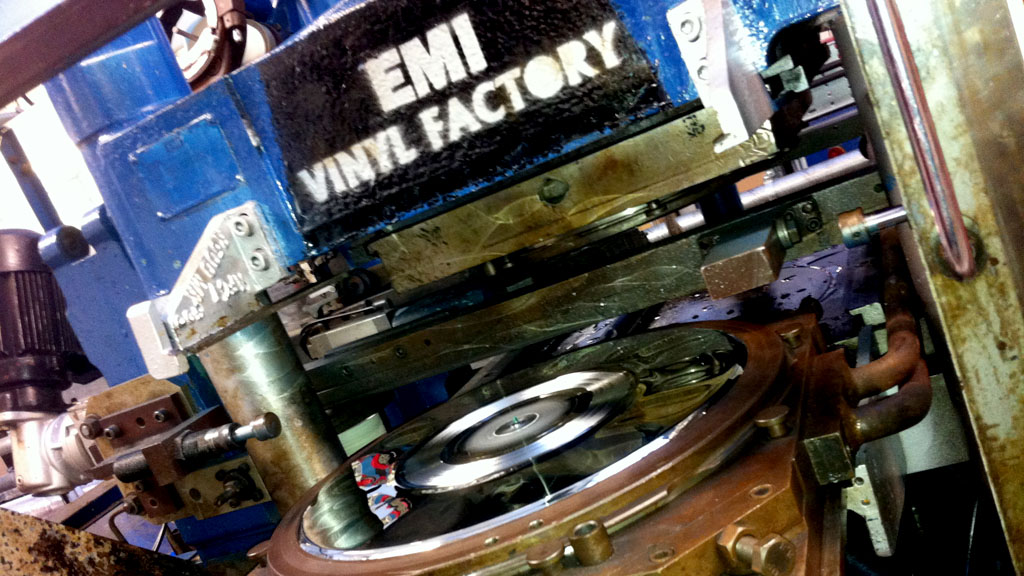Is there any future for the music album?
Is the music industry hanging on to relics of the past? Ahead of the Mercury Prize, Culture and Digital Editor Paul Mason asks what future there is for the album.
It’s a crumbly factory at the edge of London. In the year the Beatles made the White Album it employed 2,500 people, pressing half a million albums a week.
That was the year Andy Darbon started – and he’s still here, tending a vinyl press that spits out two records a minute. It’s the same process: black PVC granules melted and squashed against a plate “grown” from a master copy.
But only 16 people work at The Vinyl Factory now. And the 6,000 albums a week they’re pressing are for a niche market.
There’s definitely still a place for albums, but there’s now a huge consumption of tracks. Greg Mead, Musicmetric
The whole concept of an “album” exists because of this technology. It was in 1948 that they discovered how to put 12 tracks on a vinyl disc, at 33 rpm, instead of two at 78 rpm.
Today we don’t need to press vinyl – so why do we still need albums?
It’s a question I’m turning over in my mind as I stand on the red carpet at the Roundhouse, waiting for the Barclaycard Mercury Prize for best album.

Artists of all kinds still make albums. But the whole ecosystem of music production and listening has changed. At the offices of Musicmetric, in London’s Shoreditch, I’m finding out just how big the change is.
Consumer/curator
The CEO, Greg Mead, gives me a tour of the software he uses to track the online consumption stats for individual bands. He pulls up a graph showing that Mercury nominated act Foals, had a major spike in their fan base on 23 September – and after gaining about a thousand fans a day are now putting on between 10,000 and 15,000 a day.
“It’s not Facebook likes,” says Greg, isolating the data spike, “It’s Soundcloud. They probably had some major marketing event just then and their plays took off on Soundcloud and so did the number of people following them.”
Watch more: Mercury nominee Laura Mvula on making music 'from the heart'
In this world – the world where consumers have control – it’s about tracks and plays, not just radio airtime and album sales. Greg’s software even tracks illegal music downloads of a band’s songs, by city, which promoters then use to understand the logic – or otherwise – of where to tour.
“There’s definitely still a place for albums,” Mr Mead says. “But there’s now a huge consumption of tracks.
“On places like Spotify, Youtube and Vevo people make playlists – and what we’re seeing now is the album as a very well curated playlist by the artist.
“But people are consuming their own playlists in the same way as they would previously have consumed albums.”
The modern mix-tape
There is still some economic rationale for albums. On a global scale, though pure, digital mp3 tracks represent about half of music sales, the other half are “physical sales” – mainly CDs. And with both a CD and an iTunes album there are natural price points: £9.99 an album, 99p a track.

But the economics of the album are fast becoming nonsense. Spotify, which lets you “rent” music, or listen for free if you can endure the adverts, has 24 million users worldwide.
Watch more: Mercury nominee Jake Bugg on why there's "no music in records"
On Youtube unknown bands are building reputations, and sometimes huge underground followings.
But these social media-based services use the concept of “channels” rather than “albums”. And once the album is disaggregated, you get a very catholic mixture of bands and even genres on people’s playlists.
“You see fans who are not fans of the band but they like a song. And that happens a lot now,” Mr Mead says. “The commoditisation of music is making the type of genres people listen to much wider.
“As well as albums, you are also getting these bundles that are essentially like an album but from different albums. But artists will increasingly promote a track – because there’s not really the concept of an album on a space like Youtube.”
(Above: a word cloud of the most common words from all the song lyrics from all the Mercury music prize shortlisted albums)
So with the dawn of social media, the recorded music market has becoming democratised and fragmented – with commercially marketed acts increasingly resigned to making a larger proportion of revenues from live performance.
All of this makes it feel, to me, a bit like the Mercury might at some point go the way of EMI’s giant album factory.
The music industry is clinging to its old formats: the album, the single, the stadium gig, the headline and support act hierarchy. But the audience isn’t. It has become the collective curator.
One thing remains the same though: when we put every track from every album nominated for tonight’s award into a word cloud, it turned out that “knowing”, “loving”, “wanting” and “needing” are things that just don’t go away, even on Spotify.
The Mercury Prize will be live on More4 from 9:30pm on Wednesday.
